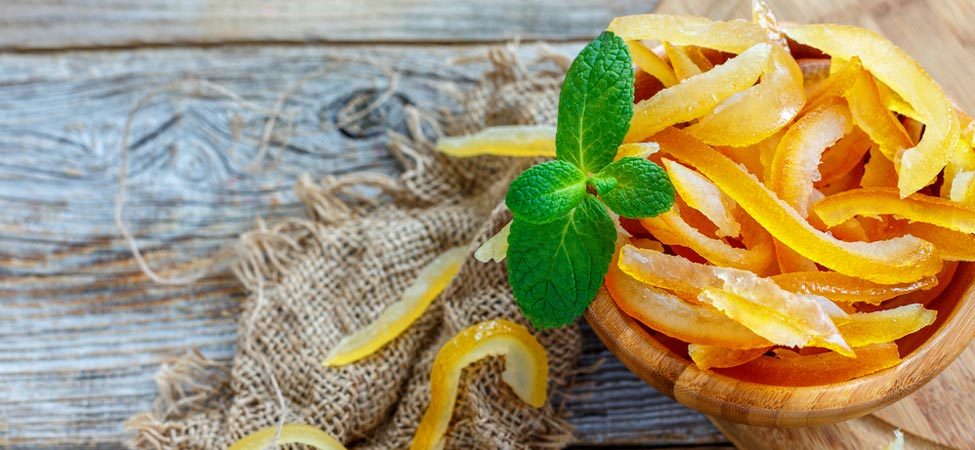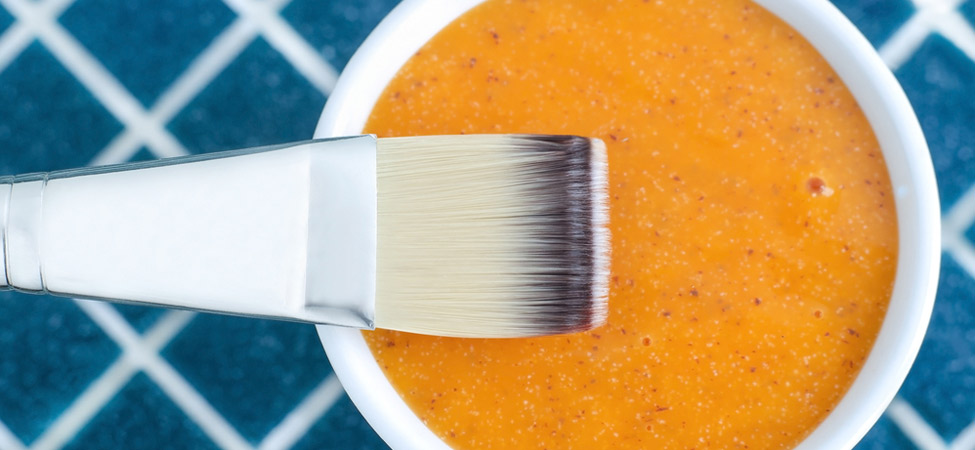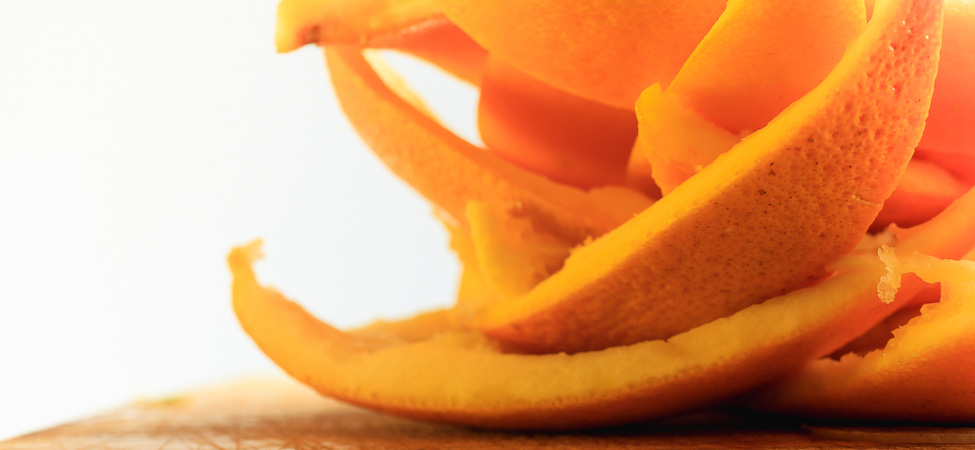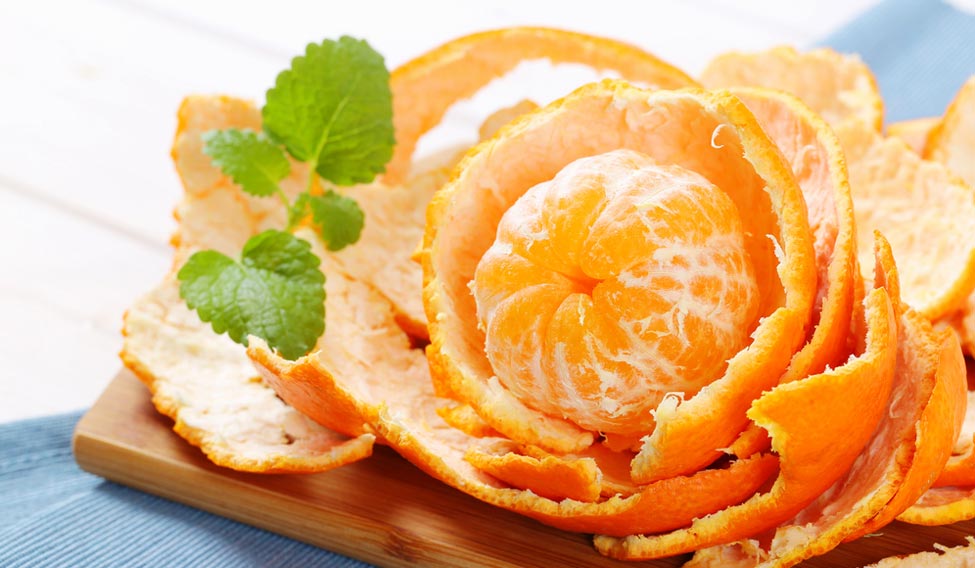Peeling oranges and popping a segment into my mouth while basking in the winter sun remains one of the fondest memories from my childhood. While I saved the peels to squeeze them into the eyes of my unsuspecting friends as a prank, my mother insisted on using them to make homemade scrubs. As I grew up, I started noticing them in marmalades and chocolates.
What we often discard as waste—orange peels—are actually packed with compounds and nutrients, making it as healthy, if not more, as the juicy segments inside. Loaded with antioxidants, anti-bacterial and anti-microbial properties, orange peel comes handy for skin care solutions, especially for ache and oily skin. And last, but not the least, its fresh scent and essential oils make it an excellent air freshener and natural cleaner for home use.
If you have been throwing away these precious peels all these years, then waste no more. Here are some ways you can reap various benefits of orange peels.
As food
 Candied orange peel
Candied orange peel
A rich source of vitamin C and flavonoids, oranges have been one of the most popular citrus fruits of all time. However, while indulging in the delicious and refreshing fruit, we often forget about its peel—a powerhouse of nutrients. In India, though orange remains a popular flavour in food, especially desserts, the fact that the peel can be consumed remains unknown in most homes. Valencene, a natural component that lends orange its aroma and flavour, is extracted from orange peels, making the peel a natural source of flavour and aroma. Therefore, next time you want a punch of orange flavour in your food, bring in the health benefits, too, by adding citrus peel or zest, or just some bits of the tart, white flesh on the inside of the peel.
As the peel adds refreshing aroma and fruity flavour to food, it also brings along many types of health-promoting flavonoids and phytonutrients. Orange peels contain hesperidin, a potent antimutagenic flavonoid that suppresses precancerous lesions and could help in preventing certain types of cancer. Orange peel has 20 per cent more hesperidin than the fruit. Also, studies have revealed that polymethoxylated flavones, found in orange and tangerine peels, have cholesterol-lowering properties. Orange peels are loaded with pectin, a natural fibre that regulates the gastrointestinal tract and acts as a prebiotic, promoting growth of beneficial probiotic bacteria in the intestines. And, of course, orange peels have high levels of vitamins—much more than what you get from the fruit—that boost the immune system.
One easy way to include orange peel in your diet is through tea. The recipe is simple: For one cup of tea, boil water and add a tablespoon of orange zest. Let it boil for 10 minutes, before you add a teaspoon of tea leaves. Boil it for two more minutes. Consider adding honey for natural sweetness. Depending on your taste, you could either have it as it is. If you prefer cold beverages, you could refrigerate it and have it cold. Improvisation with flavours can go a long way—natural spices, vanilla extract, herbs, and more.
For skin care
 Orange peel based facial mask
Orange peel based facial mask
The skin care section of retail shelves speaks volumes of vitamin C's popularity in the cosmetic and skin care industry. Vitamin C, or ascorbic acid, plays a vital role in collagen synthesis, thus reversing and preventing signs of ageing. Collagen makes skin strong, durable, and gives it a smooth and plump appearance of a young, healthy skin. In addition, the antioxidant removes toxin and sunburn, thus improving skin tone. Studies have revealed that vitamin C can limit skin damage caused by exposure to ultraviolet (UV) radiation. Also, ascorbic acid is a natural ingredient used for exfoliating the skin. While citrus fruits contain vitamin C in abundance, in some fruits, the peels have higher levels of the vitamin than the fruit itself. For example, 100gm of orange peel provides about 136mg of vitamin C, while the fruit provides about 71mg per 100gm.
You can benefit from orange peel by including it in your beauty regime. To brighten your skin naturally, you could use dried orange peel powder as base in your homemade facial masks and scrubs. For gentle exfoliation facial mask, mix orange peel powder and milk to form a thick paste. Apply it on your face and neck and leave it to dry, which should take 20 minutes, approximately. To remove the mask, rinse your face and neck with water. As the mask softens, scrub it in circular motion with your finger tips before washing your face and neck thoroughly. This mask removes dead cells and excess oil from the skin, while not making it too dry.
Home use
 Its fresh scent and essential oils make orange peel an excellent air freshener
Its fresh scent and essential oils make orange peel an excellent air freshener
Its naturally fresh scent and effective essential oils make orange peel an excellent resource for home use. Just as lavender, orange peels make an amazing natural air freshener. To make your home smell like heaven, boil handful of orange peel in water. You could add natural spices such as ginger, cardamom and cinnamon to add citrusy and spicy notes to the natural fragrance. You could also rub the peels on lights, moisture-resistant lamp shades and doors and windows for a stronger smell. This air freshening quality of orange peels come handy in kitchen, too. To get rid of the sour smell in your refrigerator, put salt on an orange rind (orange peel minus the white inside flesh) and place it in the back of the refrigerator. While salt absorbs moisture and bad odour, orange rind will fill the air with its citrus scent. For smelly ovens, try cooking orange peels in them for half an hour. Not only the oven, the entire kitchen would freshen up. Moving to your bedroom, you could make use of orange peel to eliminate the musty smell in your cupboard. Use plastic net bags or perforated paper bags to make homemade potpourris from fresh orange peels and leave them in different corners of the cupboard. As the peels dry out, they keep your closet feeling fresh, lending that fruity note to your clothes.
The essential oils in orange peel can help you get rid of grease and grime off wood and steel surfaces in the kitchen and around the house. As a quick fix, you could rub orange peels on wood and steel surfaces to make them clean and shiny. Or you could make an orange peel vinegar cleaner that smells great, is chemical free, yet effective. Soak handful of orange peel in vinegar for two weeks. Before transferring the solution into a spray bottle, strain it to remove the peels. And, well, that's it! Just spray the homemade cleaner on the wood or steel surface and wipe it off for a clean and fresh smelling kitchen and home.







